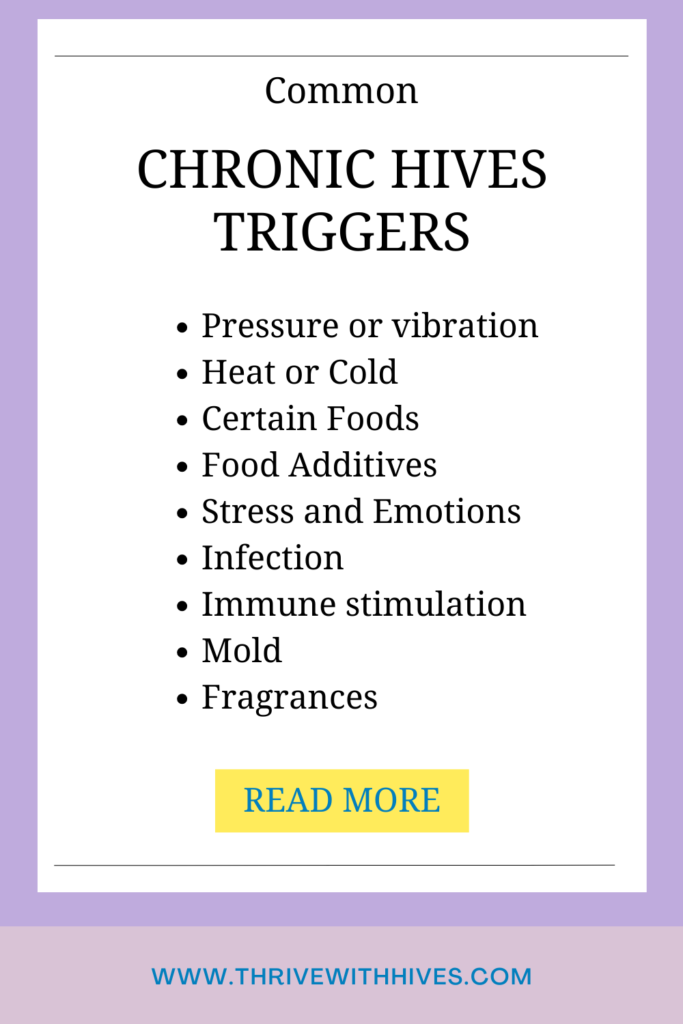Chronic Hives Triggers
Understanding Common Chronic Hives Triggers
Living with chronic urticaria is challenging, but identifying and avoiding your triggers can help to reduce the frequency and severity of your symptoms.
In this article, we will discuss the most common chronic hives triggers and how to identify your unique chronic hives triggers.
It’s important to keep in mind that triggers are different from cause. The cause of most cases of Chronic Urticaria are autoimmune or autoallergy. This means that our body is identifying itself as a threat, and activating an immune response towards our own cells.
Triggers can make our symptoms worse, or cause “flares” if you are in remission. When we learn to identify our chronic hives triggers, it can help us to better manage our symptoms.
Many people with autoimmune or autoallergy conditions had a triggering event. For example, many people had a virus or other immune response just prior to their symptoms manifesting.
We will discuss the most common chronic hives triggers and how to identify your triggers.
Food Sensitivities and Pseudo-allergens
Food sensitivities can trigger symptoms immediately after eaten, but unlike a “true allergy” they often take days to manifest depending on your level of sensitivity and the amount consumed. Some of the most common sensitivities in people with chronic hives are high histamine foods. This is likely because our body’s histamine levels are already high because of the mast cells spontaneously de-granulating and releasing chemical mediators, such as histamine.
You can learn more about low histamine diet for hives HERE.
Other common trigger foods include:
- Shellfish
- Sugar
- Dairy
- Gluten
- Nightshades – Tomatoes are one of the most common triggers for those with hives
Food Additives
Our grocery store shelves are packed with highly processed foods. Many of these include additives that can trigger our mast cells. Even the meat sometimes has thickening agents and flavors added. If you have identified food additives as a trigger, you will need to pay extra attention to these labels.
Again, this is by no means a comprehensive list. Your best bet when dealing with autoimmune or autoallergic conditions is to avoid highly processed foods altogether and opt for a whole foods, anti-inflammatory dietary template like Paleo.
Here are just a few food additives to look out for:
- Carrageenan
- MSG
- Lecithin
- Benzoates
- Sulfites
- Artificial coloring
- Aspartame and other artificial sweeteners
Medications
Non-steroidal anti-inflammatory drugs (NSAIDs) are a known trigger for many people with chronic urticaria. Dr. Marcus Maurer, head of Ucare Urticaria Specialty Clinics, recommends that anyone with CSU/CIU avoid these medications if possible.
Environmental Factors
Various environmental factors can contribute our chronic hives symptoms. Here are a few common culprits that are chronic hives triggers.
- Cold
- Heat
- Sunlight
- Pollen and seasonal allergies
- Mold exposure
- Pressure
- Vibration
- Water
- Exposure to environmental toxicants such as fragrances, herbicides, and other endocrine disrupting chemicals.
Stress and Emotional Factors
Stress is a trigger for many people with chronic urticaria. In fact, stress and hives are associated so much so that people often mistake stress as the “cause” of hives, rather than a trigger. This can be frustrating as someone with chronic urticaria, as our symptoms are often dismissed by family, friends, and even medical staff.
In fact, my family doctor wrote me a prescription for an antidepressant when I first developed hives, rather than an antihistamine. It was a frustrating experience to say the least.
When we experience stress, the body releases a cascade of chemical and makes our mast cells more ready to de-granulate. Chronic stress can make our mast cells “twitchy” according to Dr. Marcus Maurer, and this makes us more susceptible to hive flares.
Identifying your chronic hives triggers can have a significant impact on your quality of life.
Using a symptoms journal to track your symptoms can help you to identify your unique chronic hives triggers.
Some things to consider tracking:
- Day of cycle if menstruating
- Food and beverages
- Supplements and medications taken
- Sleep quality and quantity
- If you have a fitness tracker like Oura Ring, HRV can be useful to track
- Stress level
- Anything out of the norm, traveling, a fight with your spouse, a trip to Bath and Body Works, etc.
Tracking these things can help you identify your personal chronic hives triggers, as we are all unique. It’s important to remember that what is a trigger for others will not necessarily be a trigger for you. It’s helpful to share our experiences so that you can be aware of these things and identify if that is a possible hives trigger for you.
Living with chronic urticaria is physically, mentally, and emotionally draining. It’s important to lean on your support system and learn some stress management techniques. Identifying and avoiding your triggers where possible can give you back some of your power over your symptoms.
Share in the comments what chronic hives triggers you have identified.
Click HERE to Get your free guide: 5 Key Strategies to Thrive With Hives
